AI in Transportation – Top 10 Benefits and Use Cases for Modern Enterprises with examples
22 Sep 24 

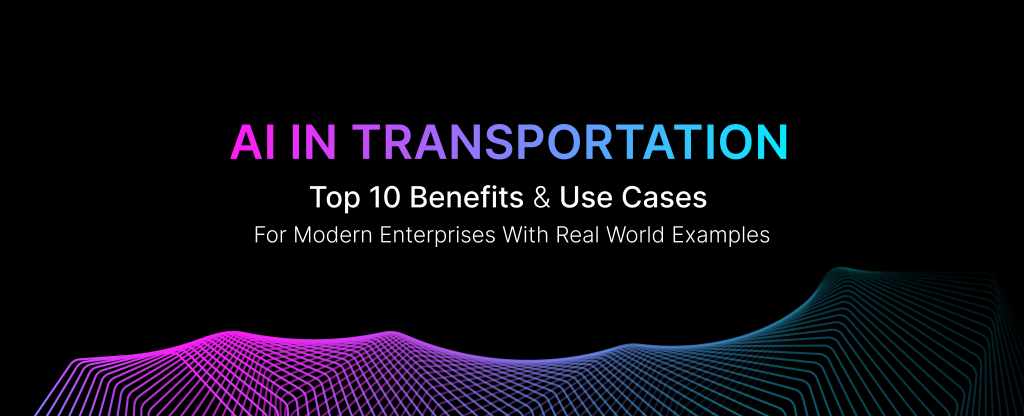
AI is revolutionizing transportation. Over 60% of global consumers believe AI will positively impact their daily lives, especially in transportation.
From predicting schedules to managing traffic, AI streamlines operations and enhances customer experiences. This technology is reshaping how we move, making transportation more efficient and user-friendly. As AI advances, its role in transportation becomes increasingly vital.
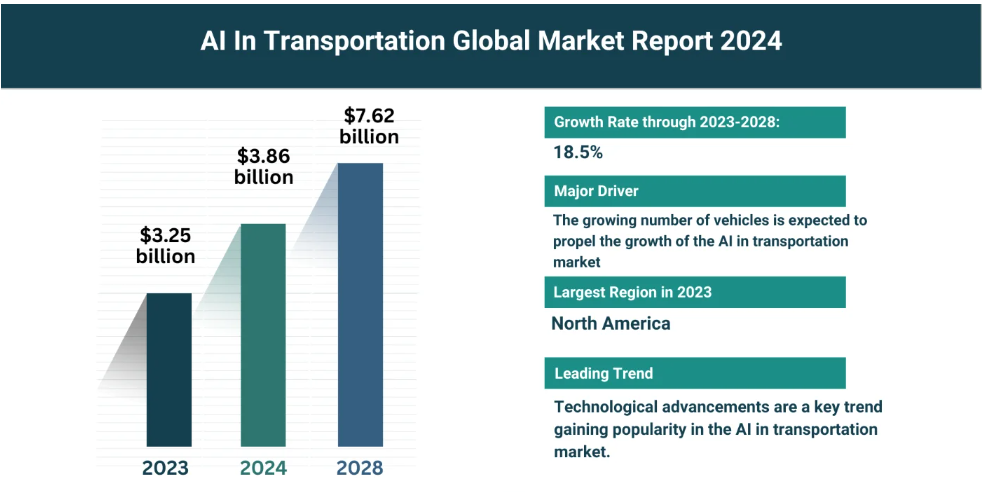
Top 10 Use Cases of AI in Transportation
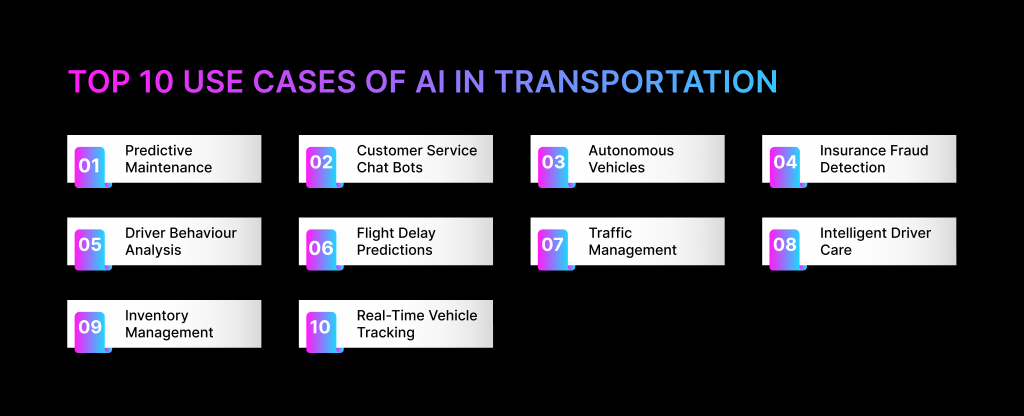
Predictive Maintenance
Predictive maintenance is a game-changer in the transportation sector. It utilizes AI algorithms to analyze data collected from vehicles and machinery, allowing companies to predict potential failures before they actually occur. By examining patterns and indicators, businesses can perform maintenance at the most optimal times, which significantly reduces both downtime and repair costs. This proactive approach not only enhances the reliability of the equipment but also extends its lifespan.
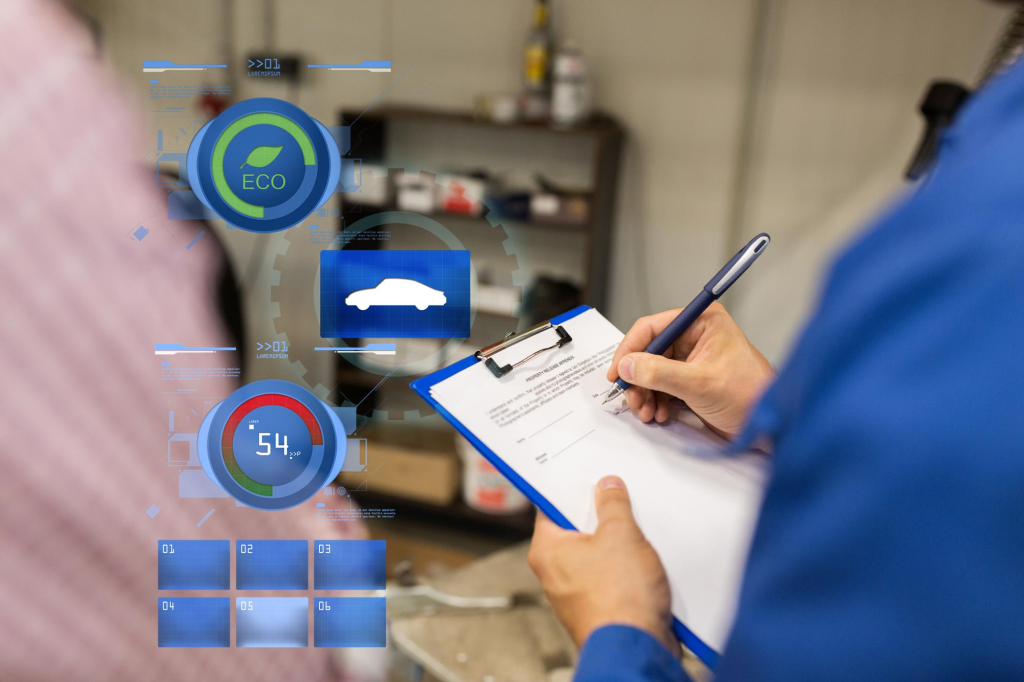
Imagine a bus that is regularly monitored for wear and tear; it can be serviced just before a breakdown occurs, ensuring that it remains operational and safe for passengers.
Customer Service Chatbots
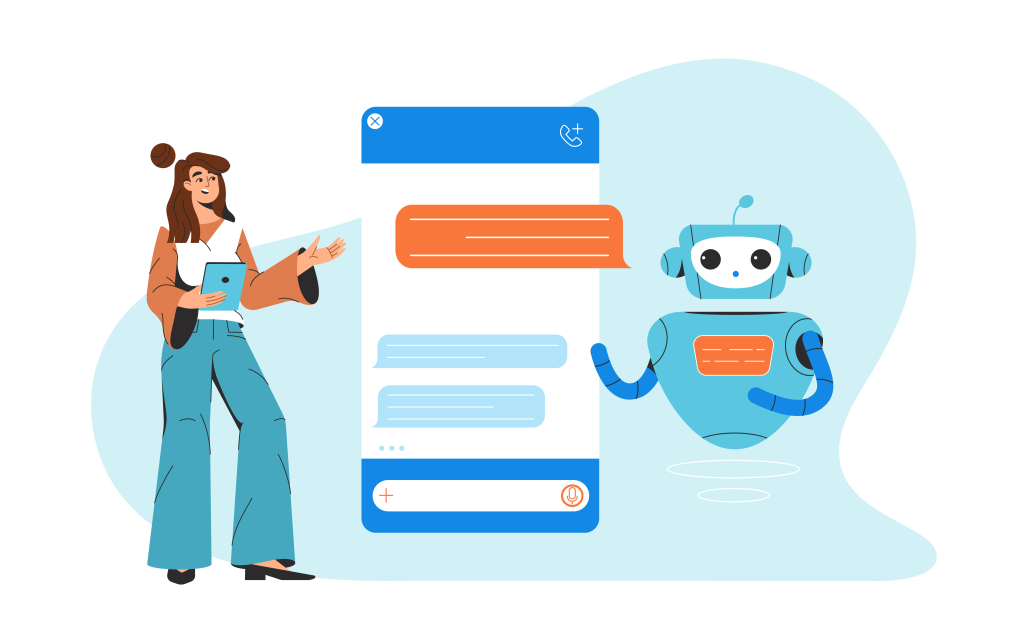
Customer service chatbots powered by AI have completely transformed how transportation companies interact with their clients. These chatbots are capable of handling a wide range of inquiries, assisting with bookings, and providing real-time updates about services.
They operate around the clock, ensuring that users receive immediate assistance whenever they need it. This constant availability significantly improves customer satisfaction, as passengers no longer have to wait for business hours to get their questions answered.
For instance, a traveler can easily check the status of their flight or book a ride through a simple chat interface, making the entire process smoother and more user-friendly.
Autonomous Vehicles
At the forefront of innovation in transportation, AI plays a crucial role in the development of autonomous vehicles. These smart vehicles utilize machine learning and advanced sensors to navigate without any human intervention.
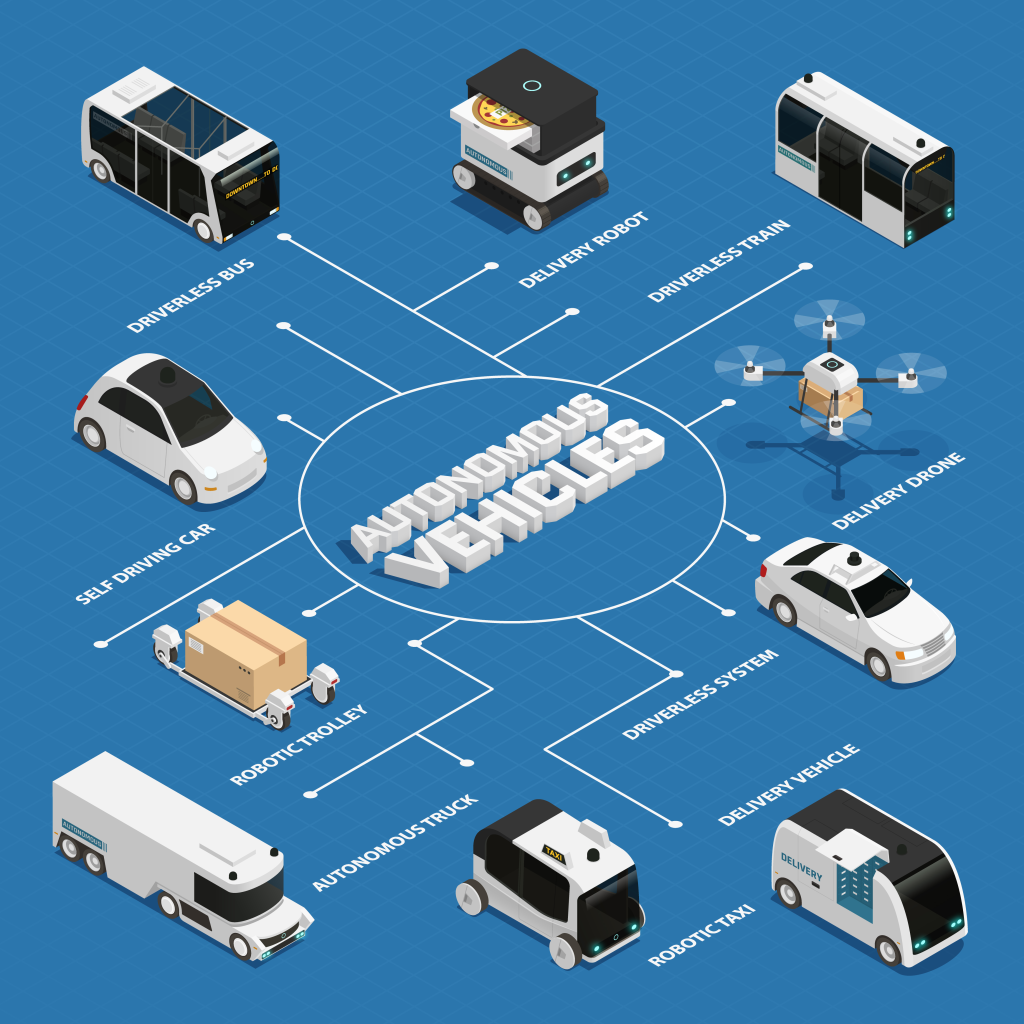
Companies like Tesla are leading the charge, pushing the boundaries of what is possible in both personal and commercial transport. The potential benefits of autonomous vehicles are enormous, particularly in terms of reducing human error and improving road safety.
Imagine a world where cars can communicate with each other to avoid accidents, or where delivery trucks can operate without a driver, making logistics more efficient.
Insurance Fraud Detection
The insurance sector within transportation is increasingly leveraging AI to combat fraudulent claims. By analyzing data patterns and identifying anomalies, AI can effectively spot potential fraud, streamlining the claims process and saving substantial amounts of money for insurers. This application not only ensures fairer practices but also enhances overall trust in the insurance system. For example, if a claim appears suspicious based on historical data, AI can flag it for further investigation, helping to protect both the company and honest customers.
Driver Behaviour Analysis
Data from various sensors can be analyzed to gain insights into driver behavior. AI can pinpoint risky driving habits, such as sudden braking or rapid acceleration, and provide feedback to improve safety. This kind of analysis is beneficial not only for coaching drivers but also for reducing accidents and saving costs related to damages and legal liabilities.
For instance, a fleet manager can receive reports on driver performance, allowing them to implement training programs that focus on safe driving practices, ultimately leading to a safer environment for everyone on the road.
Flight Delay Predictions

AI algorithms are proving to be invaluable for airlines when it comes to predicting flight delays. By analyzing historical data, weather patterns, and air traffic, these algorithms can provide accurate predictions about potential delays. This capability allows airlines to proactively inform passengers and make necessary adjustments to their schedules, ultimately improving the travel experience. Imagine being able to receive a notification about a delay before arriving at the airport, allowing you to adjust your plans accordingly.
Traffic Management
Smart cities are increasingly using AI to manage traffic more effectively. By analyzing real-time data from various sources, cities can optimize traffic signal timings, reduce congestion, and minimize wait times. The impact on daily commuters can be profound, leading to less frustration and more efficient travel. For example, during peak hours, AI can adjust traffic lights to prioritize the flow of vehicles, ensuring that rush hour is less of a hassle for everyone involved.
Real-Time Vehicle Tracking
AI enables companies to track their fleets in real time, which is a significant advantage for logistics management. This capability allows for better route planning and improved accountability. With accurate tracking, companies can provide customers with timely updates about their shipments, enhancing transparency and trust.
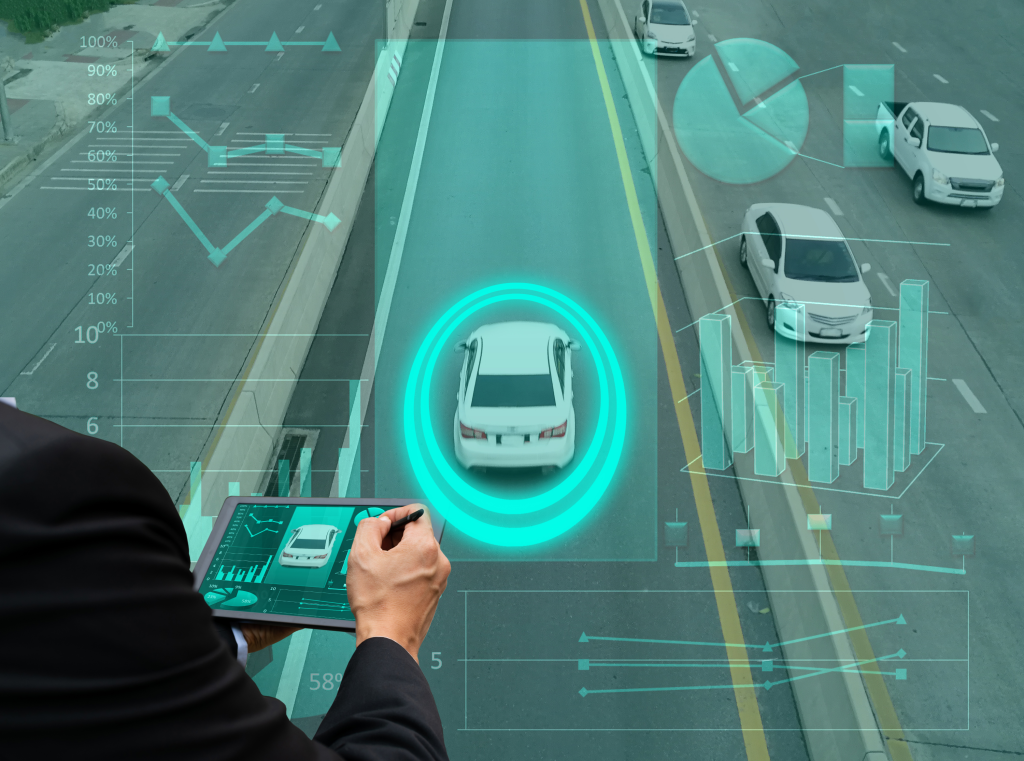
For instance, a customer can receive notifications about the exact location of their delivery, making the entire process more reliable and efficient.
Also read: 5 Best Practices to Optimize your Fleet Management Using AI
Inventory Management
AI is also making waves in inventory management within the transportation sector. By analyzing data on supply and demand, AI can help companies optimize their inventory levels, ensuring that they have the right amount of stock at the right time. This not only reduces waste but also improves overall efficiency.
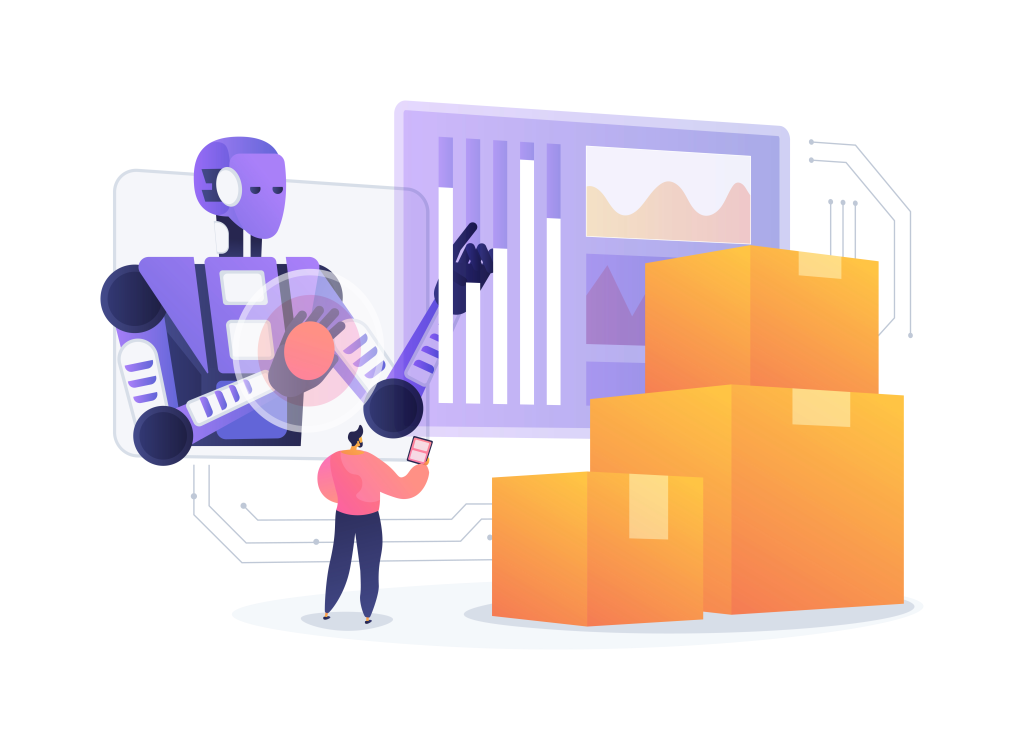
For example, a delivery service can use AI to predict which items are likely to be in high demand, allowing them to stock up accordingly and avoid delays in fulfilling orders.
In conclusion, the integration of AI in transportation is not just a trend; it is a necessity for companies looking to stay competitive. From predictive maintenance to real-time tracking, the applications of AI are vast and varied. As we continue to explore these technologies, it is essential to address the challenges that come with implementation, ensuring that the benefits can be fully realized.
AI plays a crucial role in optimizing inventory for transportation enterprises. By accurately predicting demand and thoroughly analyzing trends, companies can manage their stock levels in a highly efficient manner. This not only reduces waste but also ensures that essential resources are readily available when they are needed most. This capability is especially critical for companies that operate within tight schedules and require timely deliveries to meet customer expectations.
Intelligent Driver Care
AI technology is being increasingly utilized to enhance the well-being of drivers through intelligent driver care systems. These advanced systems can continuously monitor driver fatigue levels, provide real-time health metrics, and even suggest appropriate breaks when necessary.
By prioritizing driver health, companies not only ensure safety on the roads but also foster better efficiency and improved morale among their drivers. This focus on well-being can lead to a more productive workforce, ultimately benefiting the entire transportation operation. As a result, investing in driver care systems is becoming a vital aspect of modern transportation management.
Real World Examples of AI in Transportation
Tesla
Tesla stands out as a leading example of how artificial intelligence (AI) is changing the transportation industry. Their vehicles are equipped with advanced features, such as Autopilot, which uses AI to assist drivers with various driving tasks. This technology helps with steering, lane changes, and even parking.
The data collected from Tesla vehicles is continuously analyzed and used to improve the algorithms that power autonomous driving. This ongoing learning process showcases the immense potential of AI in making driving safer and more efficient. As more Teslas are on the road, the system learns from real-world conditions, making it smarter over time. This not only enhances the driving experience but also contributes to the development of fully autonomous vehicles in the future.
BMW
BMW’s Intelligent Personal Assistant is another great example of how AI can improve the driving experience. This built-in technology allows drivers to control various vehicle functions using simple voice commands.
For instance, drivers can adjust the temperature, change the music, or even navigate to a destination without taking their hands off the wheel. This feature makes driving more convenient and helps drivers stay focused on the road. The system learns from the driver’s preferences over time, making it even more personalized. By integrating AI into their vehicles, BMW is not just enhancing comfort but also promoting safer driving habits.
Hitachi
Hitachi is using AI for predictive maintenance in their transportation systems, which is crucial for keeping public transport running smoothly. By predicting equipment failures before they happen, Hitachi can ensure that their systems operate efficiently and reduce unexpected downtimes. This proactive approach enhances service delivery in public transportation sectors, ensuring that trains and buses run on time. For example, if a train’s engine shows signs of wear, Hitachi’s AI can alert maintenance teams to address the issue before it leads to a breakdown. This not only saves money but also improves the overall reliability of public transport, making it a more attractive option for commuters.
Audi
Audi’s AI-powered traffic navigation systems are designed to help drivers avoid congestion and find the best routes. These systems analyze real-time traffic data to suggest alternative paths, which can significantly reduce travel time.
By providing drivers with up-to-date information about traffic conditions, Audi enhances the overall driving experience. This technology not only improves efficiency but also contributes to a smoother and more enjoyable journey. For instance, if there is an accident on the usual route, the system can quickly reroute the driver to avoid delays, making every trip more efficient.
What is the Future of AI in Transportation
The future of AI in transportation looks very promising. Trends indicate that we will see increasingly intelligent systems that can learn and adapt to various conditions. As AI technology continues to advance, transportation systems are likely to become more integrated and automated. This shift will lead to safer, more efficient, and environmentally friendly solutions.
For example, we might see self-driving cars that communicate with each other to optimize traffic flow, reducing congestion and emissions. The focus will also shift towards sustainability, with innovative mobility solutions that address the challenges of urbanization. This means that cities will need to rethink how they design transportation systems to accommodate growing populations while minimizing environmental impact.
Challenges and Effective Solutions in Implementing AI in Transportation
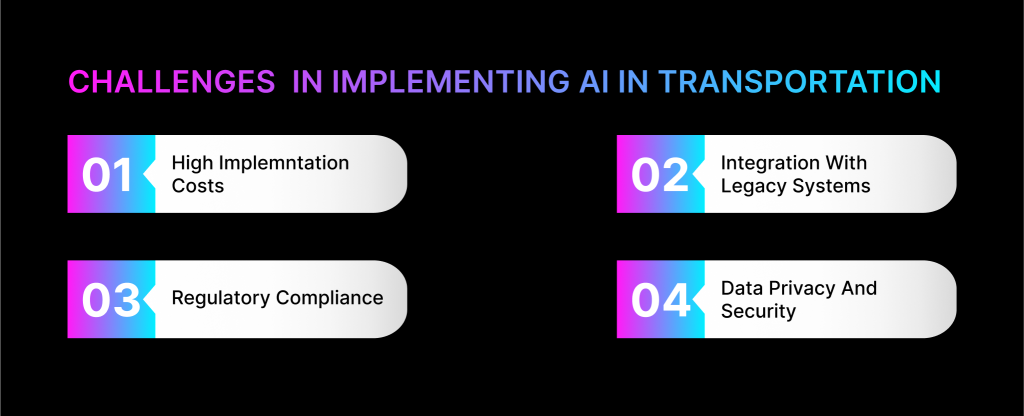
High Implementation Costs
One of the main challenges in adopting AI technology is the high initial investment. Companies may find the upfront costs significant. However, it’s important to consider the long-term savings and efficiency that can be gained. Reduced costs in maintenance, fewer accidents, and minimized time delays often justify this expense.
Also read: How To Build Truck Booking App For Shippers & Transporters
For instance, while a company may spend a lot on AI systems initially, the savings from fewer accidents and improved operational efficiency can lead to substantial financial benefits over time.
Integration with Legacy Systems
Many transportation companies still rely on older systems that may not easily integrate with new AI technologies. This can create challenges when trying to implement AI solutions. A phased approach to integration can help. By gradually adopting AI systems alongside existing processes, companies can mitigate potential issues. This allows for a smoother transition and helps staff adapt to new technologies without overwhelming them.
Regulatory Compliance
Navigating the complex regulatory frameworks can be a significant hurdle for companies adopting AI. It’s essential for businesses to be proactive in engaging with regulators. Ensuring compliance from the outset can help smooth the transition to AI technologies. By working closely with regulatory bodies, companies can better understand the requirements and avoid potential pitfalls.
Data Privacy and Security
As reliance on data increases, so does the responsibility to protect it. Implementing strong cybersecurity measures is crucial. Companies must ensure transparency in how they use data to gain public trust. This is especially important in an era where data breaches are common. By prioritizing data privacy and security, companies can maintain compliance with data protection laws and reassure customers that their information is safe.
Final Thoughts
AI’s impact on the transportation industry is profound and far-reaching. From increasing operational efficiency to enhancing safety, the benefits and applications are numerous. As companies continue to embrace AI technology, the possibilities for improvement and innovation are endless. While the challenges are significant, with strategic planning and implementation, the transportation sector can look forward to a well-connected, smarter future.
- Agentic AI1
- Android Development3
- Artificial Intelligence38
- Autopay1
- Classified App3
- Custom App Development5
- Digital Transformation12
- Doctor Appointment Booking App14
- Dropshipping1
- Ecommerce Apps40
- Education Apps2
- Fintech-Apps38
- Fitness App4
- Flutter4
- Flutter Apps20
- Food Delivery App5
- Grocery App Development1
- Grocery Apps3
- Health Care10
- IoT2
- Loyalty Programs11
- Matrimony Apps1
- Microsoft1
- Mobile App Maintenance2
- Mobile Apps134
- On Demand Marketplace1
- Product Engineering6
- Progressive Web Apps1
- React Native Apps2
- Saas Application2
- Shopify9
- Software Development3
- Taxi Booking Apps7
- Truck Booking App5
- UI UX Design8
- Uncategorized7
- Web App Development1









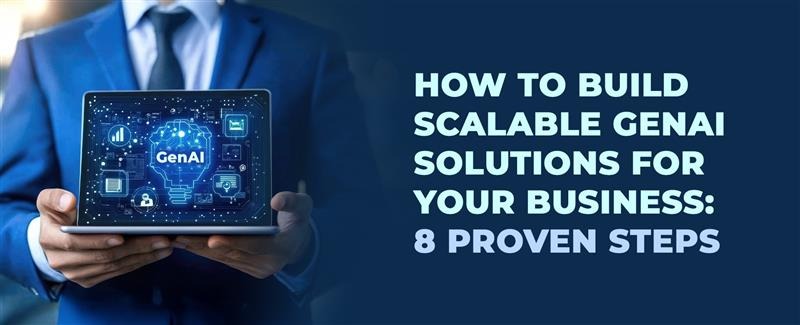
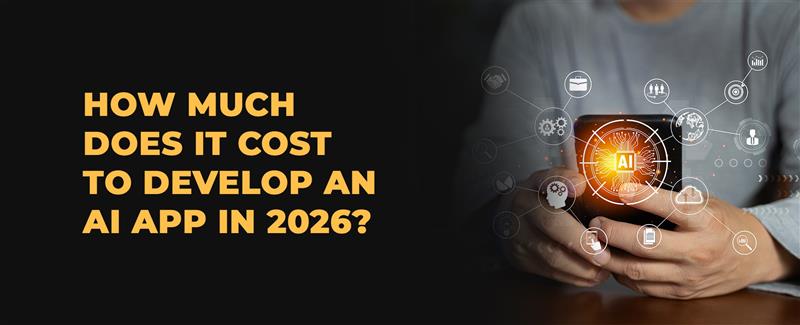
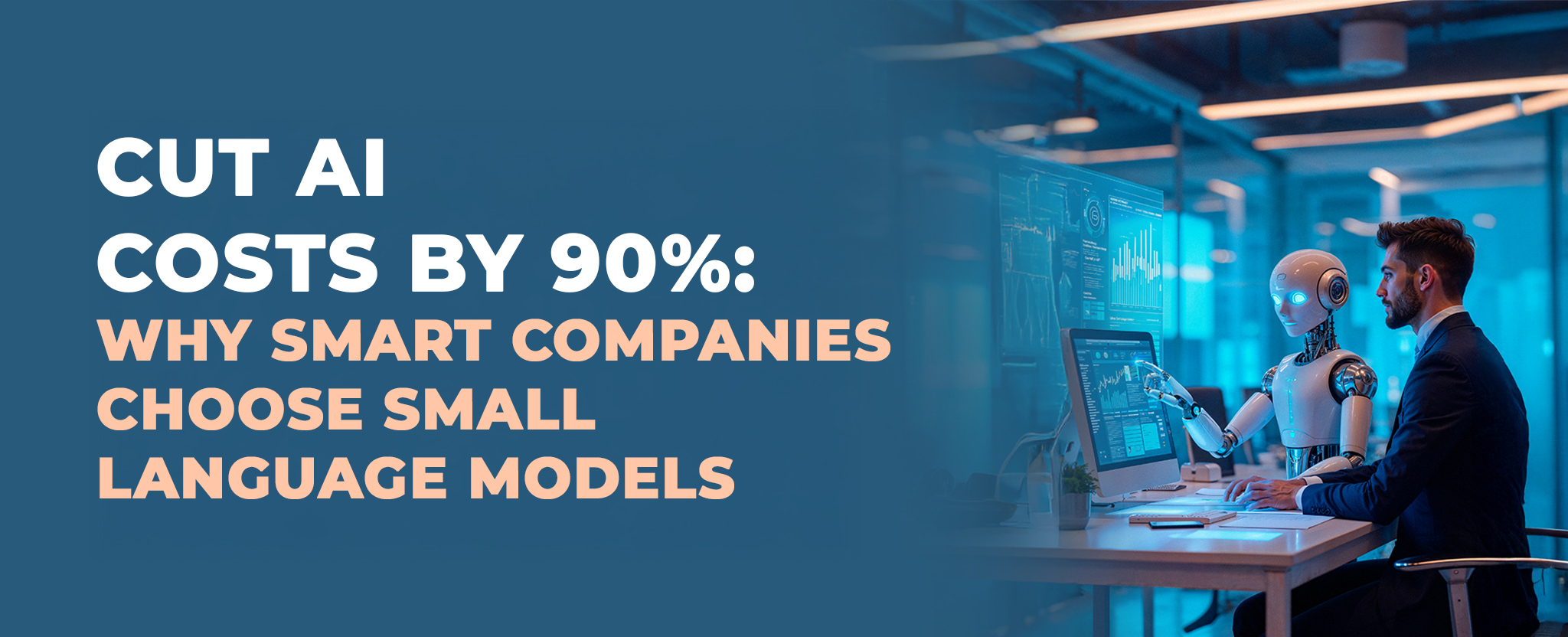







Comments